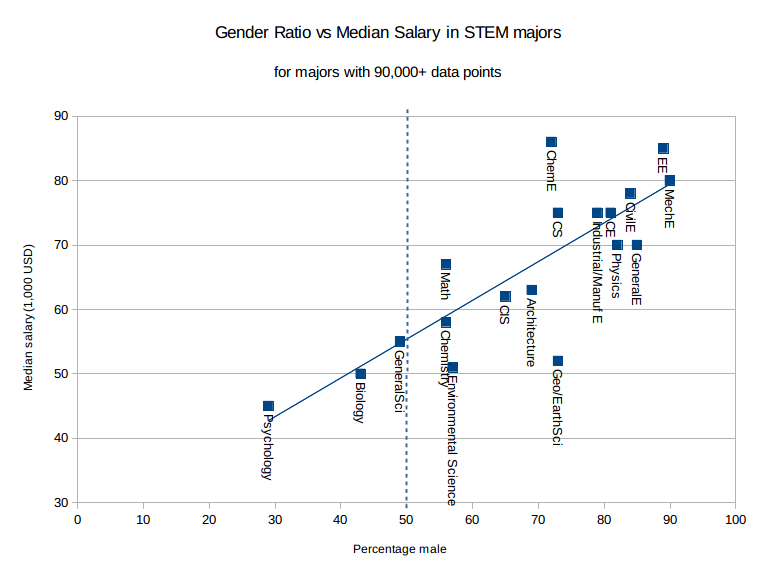Not all STEM fields are created equal
Tuesday, 28 October 2014
Alternate title: “Why do people forget about psychology when talking about STEM?”
STEM majors! Everyone needs to be a STEM major! We have a huge shortage of STEM majors! Quick, get your sons and daughters (especially daughters) to major in a STEM field!
STEM stands for “science, technology, engineering, and mathematics” and we often use it as a big bucket of Things We Want More Of. You hear the president promoting STEM fields, along with the Department of Education. A lot of money is being thrown at convincing more people to major in STEM fields in college, especially towards the issue of getting more women into STEM.
“STEM” is often found in the same sentence as “high-paying jobs”, but what’s often glossed over is that not all STEM fields are created equal. Often, when people say “STEM fields”, they mean “STEM fields that have high wages and a shortage of job candidates or certain minorities”. When we think of STEM, we often think of fields like computer science, electrical engineering, and mathematics. But many fields in STEM are not particularly high-paying or male dominated.
Biology and psychology are the two most popular STEM fields, if you consider psychology to fall under the STEM umbrella. They have some of the highest women to men ratios. And, they are a couple of the lowest paying STEM fields. In fact, if you compare gender ratios in some of the most popular STEM fields with their median incomes, you see a trend:
(All data is for people with undergraduate degrees only.)
So you see many people talking about a shortage of women in STEM, but usually referring to math, engineering, or computer-related fields. Anyone can easily generate many hypotheses as to why this trend exists. One obvious economic guess is supply and demand—having a 50-50 split versus no women at all could mean a 2x difference in the number of workers in that field and the number of people competing for the same jobs.
Psychology especially feels out of place in current STEM rhetoric. Psychology doesn’t have the problem of being male dominated, nor is it a lucrative field to be in, two of the biggest STEM talking points. And many associate it with counseling or therapy, not science. In fact, psychology is so often forgotten about when talking about STEM fields to the point where the American Psychological Association has a 14-page report that could be summed up as, “psychology is part of STEM too!”
Of course, there’s more to consider than simply money when choosing a career. Ask children what they want to be when they grow up—how many say they want to be a petroleum engineer, which is consistently ranked the #1 highest-earning major? If we really wanted more and more people to go into these high-paying STEM fields, maybe we should say, “follow the money” instead of “follow your heart”?
I have the dubious distinction of majoring in one of the top 10 highest-earning majors and also majoring in one of the top 10 lowest-earning majors, and have glimpsed into the radically different worlds in which my classmates lived in. Almost everyone who follows their heart into a low-paying job has to make some sacrifices; it is, after all, hard to find the energy for your masterpiece after a long shift of waiting tables. But the wicked part of this problem is that it’s hard to know what things will be like until far into one’s career, at which point it’s pretty difficult to turn the ship around. The best we can do is to use the best data we can find. And never look back.
All data from the What’s it Worth? report by Carnivale, Strohl, Melton. If you’re interested in this, you may want to check out Planet Money’s show on the most and least lucrative majors.

No. 1 — October 30th, 2014 at 22:08
I enjoyed reading this post. It’s very interesting to see the discrepancy in gender ratios between “Environmental Science,” and “Geo/Earth Science,” considering they are the same thing. Some schools call the major “Earth Science,” while others call it “Environmental Science,” and some split the difference with something like “Earth and Environmental Sciences.” Usually the major requirements are quite similar. That being said, “Geo/Earth Science” sounds much more technical and STEM-worthy to me than “Environmental Science,” which is reminiscent of policy.